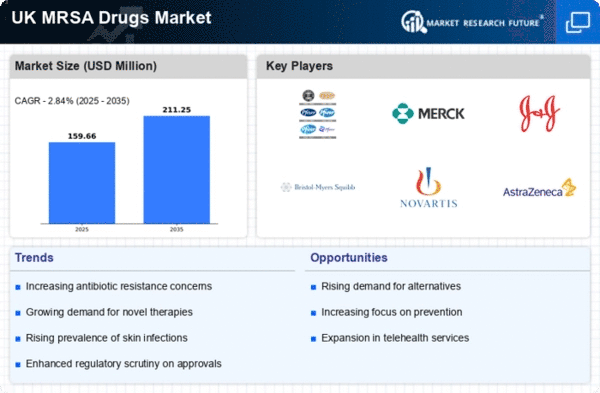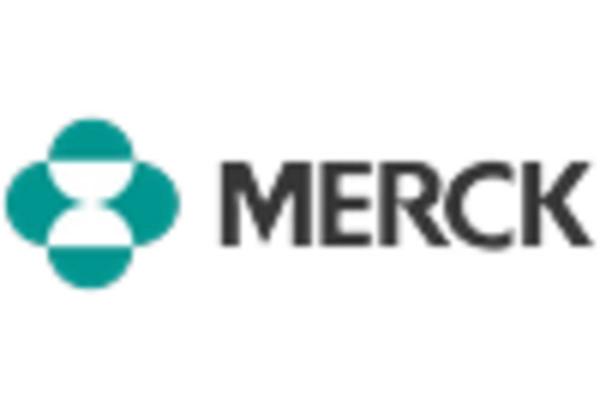Rising Healthcare Expenditure
The rising healthcare expenditure in the UK is a significant driver for the mrsa drugs market. As the government allocates more funds towards healthcare services, there is a corresponding increase in the budget for infectious disease management, including MRSA treatment. The NHS has reported a growing financial commitment to addressing antibiotic resistance, which includes funding for research and the procurement of effective MRSA drugs. This trend suggests that healthcare providers are prioritizing the development and availability of new treatment options to combat MRSA infections. Furthermore, the increasing burden of healthcare costs associated with MRSA infections, such as extended hospital stays and additional treatments, reinforces the need for effective drug solutions. Consequently, the mrsa drugs market is likely to experience growth as healthcare expenditure continues to rise.
Government Initiatives and Funding
Government initiatives and funding play a pivotal role in shaping the mrsa drugs market. The UK government has implemented various programs aimed at combating antibiotic resistance, including the UK Five Year Antimicrobial Resistance Strategy. This strategy emphasizes the importance of research and development in the field of antibiotics, providing financial support to projects focused on MRSA treatment. Additionally, public health campaigns aimed at raising awareness about antibiotic stewardship are likely to drive demand for effective MRSA drugs. The allocation of resources towards the development of new therapies not only enhances the treatment landscape but also encourages collaboration between public and private sectors. As a result, the mrsa drugs market is expected to benefit from increased investment and innovation, ultimately leading to improved patient outcomes.
Advancements in Antibiotic Development
Recent advancements in antibiotic development are significantly influencing the mrsa drugs market. The emergence of novel antibiotics and alternative therapies, such as bacteriophage therapy, presents new opportunities for treating MRSA infections. Research institutions and pharmaceutical companies in the UK are increasingly focusing on developing drugs that target resistant strains of bacteria. The UK government has also initiated funding programs aimed at fostering innovation in antibiotic research, which could lead to the introduction of breakthrough therapies. As the healthcare landscape evolves, the integration of advanced technologies in drug development processes is expected to enhance the efficacy of MRSA treatments. This focus on innovation not only addresses the urgent need for effective therapies but also positions the mrsa drugs market for substantial growth in the coming years.
Increasing Incidence of MRSA Infections
The rising incidence of MRSA infections in the UK is a critical driver for the MRSA Drugs Market. Reports indicate that MRSA infections have been steadily increasing, with a notable rise in cases reported in hospitals and community settings. This trend necessitates the development and availability of effective treatment options, thereby propelling the demand for MRSA drugs. The National Health Service (NHS) has highlighted the need for enhanced surveillance and management strategies to combat these infections. As healthcare providers seek to address this growing challenge, investments in the mrsa drugs market are likely to increase, fostering innovation and the introduction of new therapies. Furthermore, the economic burden associated with MRSA infections, estimated to cost the NHS millions annually, underscores the urgency for effective drug solutions, thereby stimulating market growth.
Collaboration Between Public and Private Sectors
Collaboration between public and private sectors is emerging as a crucial driver for the mrsa drugs market. Partnerships between government agencies, research institutions, and pharmaceutical companies are fostering innovation in the development of MRSA treatments. These collaborations often result in shared resources, expertise, and funding, which can accelerate the research and development process. The UK government has been actively promoting such partnerships to enhance the effectiveness of antibiotic development initiatives. By leveraging the strengths of both sectors, the mrsa drugs market can benefit from a more robust pipeline of new therapies. This collaborative approach not only addresses the urgent need for effective MRSA drugs but also enhances the overall healthcare landscape, potentially leading to improved patient outcomes and reduced healthcare costs.
















